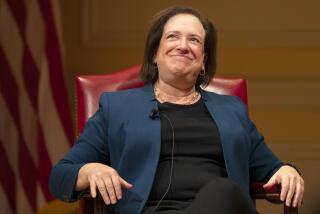Limit on ‘Double Jeopardy’ to Get High Court Hearing : Law: A decision to curb the constitutional protection would give more leeway to prosecutors and clear up confusion over 1990 ruling.
- Share via
WASHINGTON — The Supreme Court said Monday that it will consider limiting the Constitution’s protection against “double jeopardy” and possibly overrule a precedent handed down just two years ago.
The high court decision, due next year, could free prosecutors to bring new charges against a defendant who has already been punished once for his conduct. The ruling could also help clear up confusion in the law.
The issue concerns the Fifth Amendment’s guarantee that no one shall “be twice put in jeopardy of life or limb . . . for the same offence.”
While that principle has ancient roots, the Supreme Court has struggled to give it precise meaning.
Until 1990, the court had stressed that a defendant could be prosecuted twice for two different criminal offenses, even if they grew out of the same incident. For example, a motorist who caused an accident could be punished first for speeding and later for “vehicular homicide” if the accident victim died.
But in May, 1990, the high court prohibited a second criminal prosecution stemming from the “same conduct.” In that ruling, the justices, on a 5-4 vote, said that New York authorities could not prosecute a drunken motorist for homicide because he already had been allowed to plead guilty and accept punishment for drunken driving.
In an opinion by now-retired Justice William J. Brennan, the court adopted a new rule: The Fifth Amendment “bars subsequent prosecution” if authorities rely on “conduct . . . for which the defendant has already been prosecuted.”
Since then, however, Brennan and Justice Thurgood Marshall have left the court and been replaced by two appointees of President Bush’s. On the day of his retirement last year, Marshall cited the 1990 case, Grady vs. Corbin, as an endangered precedent.
On Monday, the court announced that it would hear an appeal filed by Bush Administration attorneys suggesting that the court “reconsider the reasoning and the result” set forth in the 1990 decision.
“I would guess this is the vehicle to overrule Grady vs. Corbin,” said Georgetown University Law Prof. William Greenhalgh. “And it will be welcome relief for state and federal prosecutors.”
According to Administration lawyers, a defendant may be prosecuted more than once as long as he is not being charged twice for the “same offense.”
The issue came to the court Monday in a Washington, D.C., case in which a defendant was charged with a criminal violation after he had been punished through a “criminal contempt” order from a court.
In 1988, Alvin J. Dixon, who had been freed on bond while awaiting trial on a murder charge, was arrested for selling cocaine. When a judge heard of this arrest, he revoked the bond and sentenced Dixon to 180 days in jail for “criminal contempt” for having violated the terms of his bail.
District prosecutors also indicted Dixon for selling the cocaine. Based on the Grady vs. Corbin ruling, however, a court in Washington threw out the drug charge on the grounds that Dixon was being prosecuted twice for the same conduct.
U.S. Solicitor General Kenneth W. Starr argued that the second prosecution should be reinstated because criminal contempt and cocaine distribution are not the “same offense.”
The case (U.S. vs. Dixon, 91-1231) will be argued in the fall with a ruling due early next year.
In other actions Monday, the court:
--Passed up a chance to further limit the authority of the U.S. 9th Circuit Court of Appeals to delay executions. That issue gained national attention last week when the justices lifted four stays of execution granted by the 9th Circuit in the case of killer Robert Alton Harris, who eventually was put to death in California’s gas chamber.
By coincidence, California prosecutors have had an appeal pending that urges the justices to revoke a 9th Circuit rule allowing federal judges to delay a state execution for a few weeks to give a Death Row inmate time to file an initial appeal in federal court. Such delays are rarely an issue because state executions are scheduled far enough in advance to permit appeals.
Without comment or dissent, the court rejected the appeal in the case (Vasquez vs. Brown, 91-1425), and let the 9th Circuit policy stand.
--Agreed to consider making it more difficult for oil and gas investors to take a tax deduction for depreciation (U.S. vs. Hill, 91-1421). Last year, a federal appeals court adopted a more lenient approach, which, if upheld, would cost the government more than $1 billion in lost revenues, according to Justice Department lawyers.
More to Read
Sign up for Essential California
The most important California stories and recommendations in your inbox every morning.
You may occasionally receive promotional content from the Los Angeles Times.














